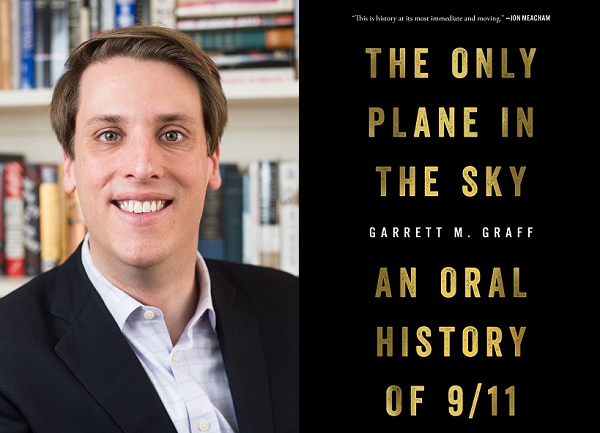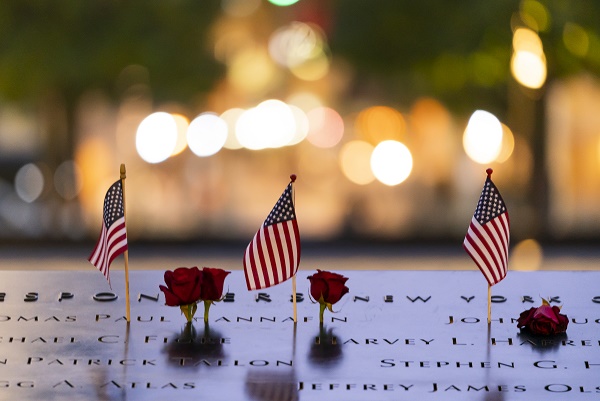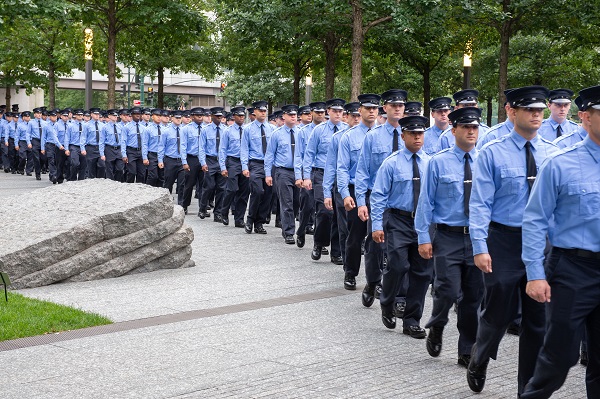Make a donation to the museum
Q&A with Garrett Graff, Author of "The Only Plane in the Sky: An Oral History of 9/11"
Q&A with Garrett Graff, Author of "The Only Plane in the Sky: An Oral History of 9/11"

The 9/11 Memorial & Museum’s public programming season kicks off on Thursday, Sept. 17, with a conversation with journalist and historian Garrett Graff. Graff’s newest book, “The Only Plane in the Sky,” provides a comprehensive, minute-by-minute account of the attacks based on extensive research and oral history interviews. In the Q&A below, Graff talks about his inspiration for and experience of writing this book.
You can reserve a ticket for Thursday’s program here or watch live here.
Tell us about your book “The Only Plane in the Sky.” What inspired you to tell this story?
I've effectively spent most of my journalism career covering the ramifications, consequences and decisions that grew out of America’s response to 9/11, writing about the FBI, terrorism, surveillance, the military conflicts in Iraq and Afghanistan, and the political landscape it scrambled and rewrote in just 102 minutes one Tuesday. Two of my previous books, actually, “The Threat Matrix” about Robert Mueller and the FBI and “Raven Rock” about the U.S. government's doomsday plans, focused in large part on the events of 9/11. It's nearly impossible in the world of national security to write about any subject where the core of the story isn't about the decisions made in the wake of and amid the fear after 9/11.
In writing “Raven Rock,” about the Cold War and the U.S. government’s secret plans for doomsday, I became fascinated with the story of President George W. Bush on 9/11—how at the moment of the nation’s greatest need for leadership, he spent much of the day hidden aboard Air Force One, stuck in a metal tube seven miles above the earth with little communication and little understanding of what was transpiring to his nation below. And so when I found myself weeks before the 15th anniversary sitting next to the wife of the colonel who piloted Air Force One that day, I set out to do an oral history centered on that flight and that day. I wasn’t interested in the facts of the day, which have been well-documented and are familiar to all of us, but instead about simply what it was like to live through the day—the surprise, the fear, the chaos.
The reaction to the story when it published in September 2016 for the 15th anniversary of 9/11 was immediate—and overwhelming. Within days, “We’re The Only Plane in the Sky” had become POLITICO Magazine’s most-read article of all time. As people read, they wrote. That first day it published, a Friday, dozens of readers began to send me their own stories and memories of that day, then it was scores, then by the end of the weekend, hundreds. I heard from people across the United States, naturally, but also from readers from every continent but Antarctica, from readers in Spain, Poland, Egypt, Russia, Thailand, Korea and Australia, among other places. I ended up spending days doing interviews on the piece, including 20 minutes on Radio New Zealand, never contemplating until then what 9/11 was like for those in the Pacific, for whom “9/11” was actually 9/12—that when they awoke, all of this tragedy had unfolded overnight, the attacks, the collapse, everything. Similarly, I’d never imagined how the events might have struck someone far removed in a country like Poland—how the attack on us felt like an attack on them.
Two reactions from readers, though, stuck in my mind in particular: One came from a mother, a veteran, who wrote to say that she had two children, 7 and 9, and that she had printed out my article and set it aside so that when her children were old enough to read, she could use it to explain why mommy went off to war. Another young veteran of three deployments, two to Afghanistan, one to Iraq, wrote in to tell me that he’d only been in middle school on 9/11, and had fought in the two wars that day spawned without ever fully grasping the trauma the nation felt on 9/11. I was dumbfounded—what must it be like to be one of the servicemen or -women fighting overseas today who has no memory of September 11 itself?
The totality of that reader reaction—and the idea of helping current and future generations understand this day—led me to expand that article into this book.
Could you tell us about your experience researching the events of 9/11 and interviewing witnesses and survivors?
To construct this book, I worked for two years with Jenny Pachucki, an oral historian who I actually hired from the 9/11 Museum & Memorial and who has dedicated her career to stories of September 11, and together we located about 5,000 relevant oral histories collected and archived around the country, including at the 9/11 Museum, the 9/11 Tribute Center, the Flight 93 National Memorial, the historian’s offices at the U.S. House of Representatives and the Pentagon, and many other sources and archives. We closely read or listened to about 2,000 of those stories to identify the voices and memories that are ultimately featured here in the book.
This probably sounds dumb in hindsight, but I was really unprepared for how emotional the writing of this book would be. Seeing 9/11 through the lens of others forever changed my understanding of that day. The names in this book are ones I will never forget—and I imagine you won’t soon either. Dan and Jean Potter. Beverly Eckert. Charles Christophe. Ileana Mayorga. Richard Eichen. Will Jimeno. Jay Jonas. Rick King. Pasquale and Louise Buzzelli. Ellen Eckert. Dee Burnett. Ordinary Americans who woke up and went to work expecting another Tuesday and instead found themselves confronting unimaginable events.
Two types of stories stand out to me—one sad, one hopeful. First were simply the stories of the loss of loved ones on 9/11—parents losing children, children losing parents, siblings, the last telephone calls from the hijacked planes or those trapped above the attacks in the World Trade Center. Those stories are just heartbreaking. I cried almost every day when I was drafting the book last summer, poring over these intimate stories of the worst day imaginable.
Second was the inspirational way ordinary people stepped up across the country to help—from rescuing colleagues and strangers at the attack sites to volunteers rushing in to help. In the book, Ileana Mayorga, who worked for a volunteer agency in Arlington, Va., where the Pentagon is located, talked about how undocumented immigrants started to call and ask to help: “Suddenly the phones were ringing and saying, ‘This is the country that we chose to come [to]. Nobody will destroy our country.’ They would say, ‘I’m not legal in the United States. Do you think they will accept me to do volunteer work?’” Especially given the political environment today, I thought that was so inspirational.
All told, “The Only Plane in the Sky” is based on 480 oral histories, conducted by myself as well as dozens of other historians and journalists over the last 17 years. It was hard because we were trying to distill and connect numerous stories into a single narrative—so there are all sorts of important details, amazing stories and critical insights I didn't have room to include. I'm sure another author could sit down with the same giant pile of oral histories and create another amazing book that didn't have a single overlapping quotation.
What surprised you most in writing this book?
The details that most surprised me—and that I tried to really capture in the book revolved around the sensory experience of 9/11. We all remember the sights of 9/11, because we watched it together on TV, but for those caught in its midst, they experienced it with 360-degree senses, so I spent a lot of effort in the book to capture the sounds of 9/11, the smells of 9/11, the tastes of 9/11, what 9/11 felt like. The volunteer firefighters in Shanksville all commented on the unforgettable smell of the crash site. The first responders and survivors of the towers' collapse talked about the taste of the dust caught in their mouth, the feeling of walking amid that dust through lower Manhattan. And many people around the country commented on the profound quiet of the day—how haunting and silent it seemed in the afternoon after all the planes in the sky were grounded.
What do you hope readers take away from this book?
I'm hopeful that this book will help a new generation understand what it was like to live 9/11, not just the facts and the history of that day, but the experience of that day, the trauma, the chaos, the confusion, the fear. We tell ourselves now this much neater and cleaner story about 9/11: four planes, Twin Towers, Pentagon, Shanksville, all over in 102 minutes. We didn’t know that then. Even late into the afternoon, we feared more hijacked planes. Buildings were evacuated across the country. We didn't know when the attacks began, nor when they ended. And the confusion was clear at all levels: President Bush was watching the day unfold on Air Force One using old rabbit-ear TV antennas because there was no email or cable/satellite TV aboard Air Force One then. Just think about that: for most of the day, the President knew less than the average American sitting at home watching CNN.
Have you visited the 9/11 Memorial & Museum? What was your experience? What does it mean for you to be doing this program at the 9/11 Memorial & Museum?
Yes, I've visited several times—and the 9/11 Memorial & Museum was a huge help to me in my research, both opening its oral history collection to me and helping sort through myriad factual questions. I wrote in the book actually about how moving I found the experience of touring the site and how I almost instantly burst into tears when I turned around in the Museum and found myself face to face with the remains of Ladder 3.
I'm quite excited and nervous about speaking at the Museum, which is as close to hallowed ground for this day as we have in our country. Many of the stories in this book grew out of the 9/11 Museum's community, and I feel that as much as this is my book, it's the story of our country and the people who lived that day, so it's a tremendous honor to me be able to speak to that community.
By 9/11 Memorial Staff
Previous Post
Commemorative Events and Special Programs Held in Honor of the 18th Anniversary of the 9/11 Attacks

Each year, during the week of September 11, the 9/11 Memorial & Museum hosts, supports or participates in many commemorative events and special programs to highlight that the effects of these attacks are still felt. These are some of the events we held to this week to mark the 18th anniversary of the 9/11 attacks.
Next Post
FDNY Probationary Firefighters and Legacy Cadets Visit 9/11 Memorial

Around 300 FDNY probationary firefighters lined the South Pool of the 9/11 Memorial on Monday to lay a wreath near the inscribed names of the 343 members of the FDNY who were killed in the line of duty on 9/11.